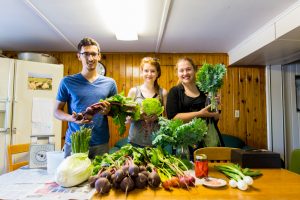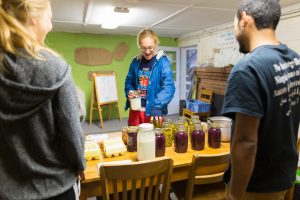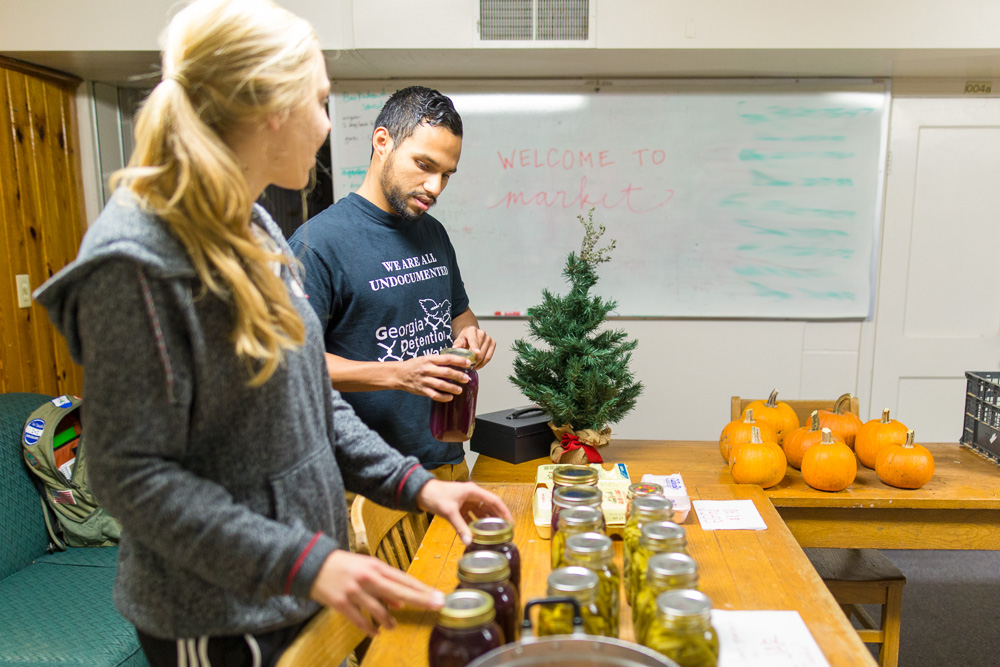Students used to leave farming behind when they came to academia, so the stories go. Today, though, there is a resurgence in back-to-the-land skill-building among Millennials, as noted by Michaela Mast, market coordinator for Eastern Mennonite University’s Sustainable Food Initiative. Gardening, animal husbandry, harvesting and preserving vegetables draw students to SFI, and the products draw campus to a free “market” every Wednesday.

SFI has sold bounty from the campus gardens for years, but this semester, the club began offering their vegetables, local milk share and home-canned goods for free. The milk, bought out of the club’s budget, comes from Persimmon Dairy on Willow Run Road.
Between 25 and 75 customers stop by each Wednesday for jalapeños, tomatoes, pumpkins, figs from the edible landscaping on campus, and student-made preserves.
“Everyone comes for jam!” Mast jokes of the grape and berry jam made by Clara Bush. At their opening market this semester, students lined up a half an hour before the doors opened. For sale were eggs from the campus chickens and bread baked by five student volunteers. The chickens, a joint project with the Earthkeepers club, are cared for by seven volunteers managed by junior Aubrey Shelley. Mast, a psychology major with music and biology minors, hopes the markets will both build community and make buyers think about food origins.

Besides the good eating, Mast believes SFI attracts workers and patrons through their camaraderie and environmentalism. Many of the first-years who come to market ask how they can get involved, such as now-junior Kat Lehman. Lehman, who has been involved in SFI in a variety of roles, hails from a farming family in Dover, Ohio.
“Gardening connects me to my dad,” says Lehman. The two recently planted garlic while she was home for Thanksgiving break, and Lehman brought their surplus back to Harrisonburg, where it is now planted in SFI’s Mount Clinton Garden.
“It’s a very therapeutic pastime, gardening is,” says Mast. “We all eat food! It’s a place where we can all find common ground.”
“Going out every morning to the garden and spending a good solid hour on my own, picking produce or weeding … it’s kind of a spiritual experience,” says Diego Barahona, a senior biochemistry major who is one of four paid SFI workers.
This semester, SFI hosted lima and green bean picking and preserving parties, sustainability tours for Transitions classes and Eastern Mennonite Elementary School, a chicken butchering workshop, and various group meals.
Faculty advisor Gregory Sachs, building automation coordinator for the physical plant and backyard chicken farmer, led the butchering workshop for six students. The participants shared the meat of the three roosters they processed.
SFI also has an ongoing relationship with Virginia Mennonite Retirement Community’s Farm at Willow Run, managed by Tom Brenneman ’92. Throughout the seasons, Brenneman calls in SFI’s “crop mobs,” groups of students willing to harvest surplus corn, potatoes, or peppers as needed. Some of this produce ends up on SFI’s market table. Brenneman also coaches them in crop management, as does Jonathan McRay, gardener and Center for Justice and Peacebuilding graduate.
“It’s EMU campus having a wider footprint on its surroundings,” says Barahona of SFI’s networking opportunities with local farmers.
Mast cites childhood gardening with her mother in the Broadway countryside as her introduction to the “life-giving” hobby. She is also a passionate member of DivestEMU, a student organization advocating for EMU to divest from fossil fuels and reinvest in “environmentally responsible corporations.”
“I think gardening is one of the best ways to grow an appreciation for the Earth and what it gives us,” says Mast.

Enjoyed reading this article. When I taught 4th grade, I actually had a dream about a beautiful garden as part of the curriculum.